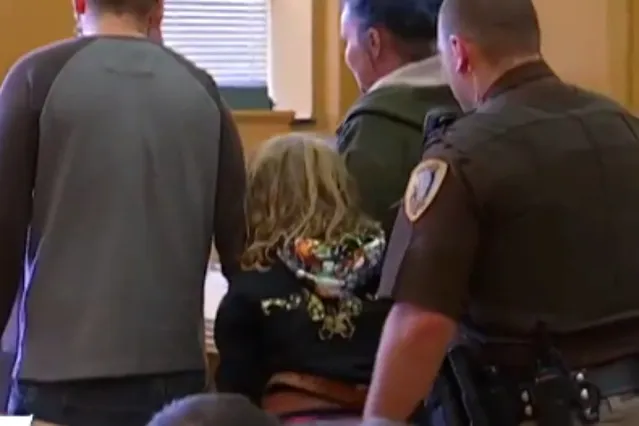A 10-year-old girl in Wisconsin was charged with homicide in 2019.
This was after the tragic death of a 6-month-old infant, Jaxon Hunter.
Her case gained national attention because homicide cases involving children as young as 10 are exceedingly rare.
Between 2007 and 2016, only 44 children aged 10 or younger were believed to be responsible for homicides in the United States
This is according to data from criminologist James Alan Fox.
Out of these, only seven were girls until this recent case which has changed that statistics.
 |
| Jaxon Hunter ( source - inside edition) |
The recent case of this 10-year-old girl, known in court as A.F., is particularly striking.
This is because of her age and the severity of the charges against her.
A.F. was reportedly in foster care at the time of the incident.
The day care facility where the incident occurred, Amber's Pals and Playmates, was run by Amber Sweeney, who is A.F's foster parent.
She had been removed from her biological parents' custody in September, 2019.
Court documents later revealed a troubling history of trauma and instability in A.F.'s young life.
This likely contribued to her inability to comprehend the gravity of her actions at the time of the crime.
On that fateful day, A.F. was at the daycare along with several other children, including the infant.
While they were playing, A.F. allegedly dropped the infant.
When the baby began to cry, she reportedly struck the baby on the head and stomped on him, in a state of panic.
The day care operator, Amber Sweeney, said she was the only adult supervising the children when the incident occurred.
Following the incident, authorities launched an investigation into both A.F.'s actions and the circumstances surrounding her care.
As the investigation unfolded, it became clear that A.F. had experienced significant trauma throughout her young life.
This contributed to her current mental state at the time of the crime.
Dr. Deborah Collins, a child psychologist, testified during a competency hearing.
She stated that A.F. exhibited symptoms consistent with post-traumatic stress disorder (PTSD) and disruptive mood dysregulation disorder.
She believed this likely stemmed from her turbulent upbringing.
The legal framework in Wisconsin stipulates that children aged 10 and older must be charged as adults for serious crimes like homicide.
This has sparked debate among legal experts and child psychologists regarding the appropriateness of such measures.
Many argue that children, especially those with troubled backgrounds, require rehabilitation rather than punishment.
Seeking Justice: The Legal Proceedings
As A.F. was brought into the courtroom in handcuffs, the proceedings became a focal point for discussions about juvenile justice reform.
Her emotional state was evident as she sobbed during her court appearance, coloring in a unicorn coloring book while waiting for her hearing.
During the trial, both the prosecution and defense presented expert testimony on A.F.'s mental capacity to stand trial.
Ultimately, Judge James Peterson ruled A.F. not competent to stand trial.
He emphasized the need for her to receive proper mental health treatment and education.
The court ordered her to be placed in the custody of the Department of Health Services (DHS)
During this time she will receive necessary interventions to support her psychological development.
As the case progresses, the broader implications for juvenile justice are coming to light.
Advocates for reform are urging a shift away from punitive measures towards rehabilitation and support for at-risk youth.
The case of A.F. starkly contrasts with other recent cases.
For instance, an 11-year-old boy in New Hampshire shot and killed two adults but was charged as a juvenile.
This clearly illustrates the differing responses to young offenders based on their circumstances.
Experts argue that charging children as adults fails to deter future crimes or contribute positively to community safety.
Instead, it perpetuates a cycle of trauma and punishment that does not address the root causes of juvenile delinquency.
With the right support and intervention, even the most troubled youths can find a path to healing and redemption.



.jpg)

Comments
Post a Comment